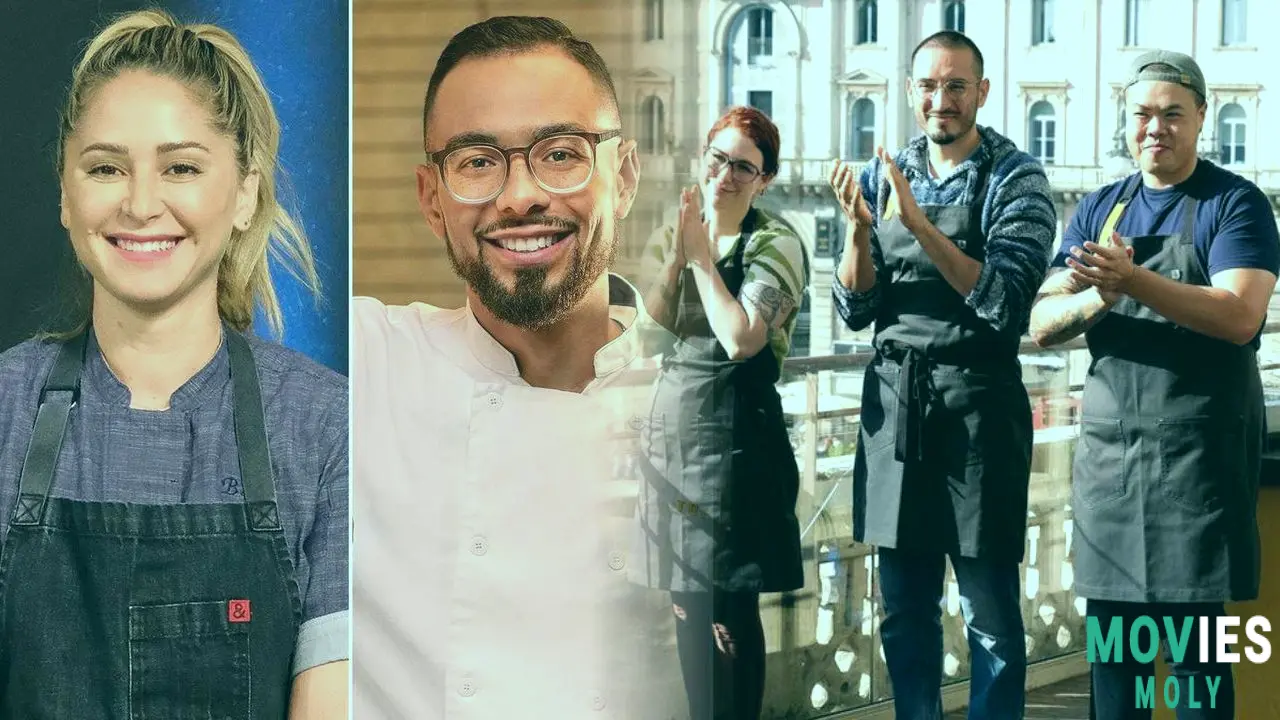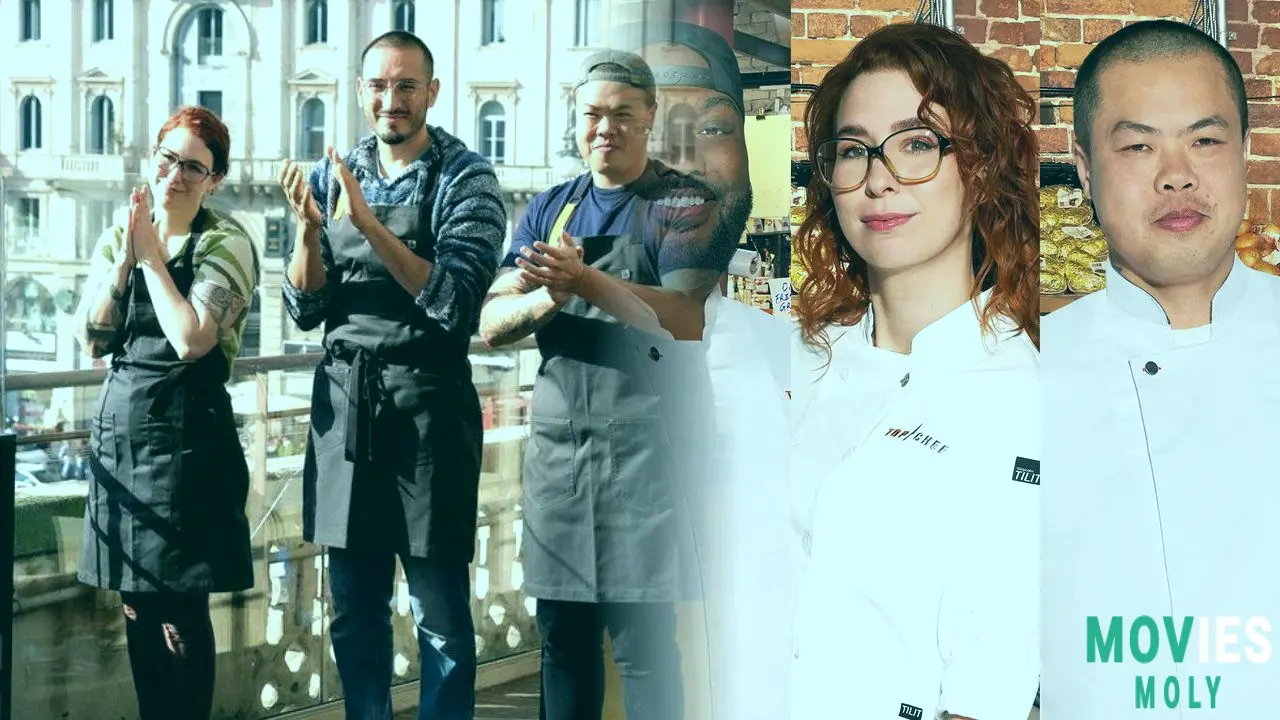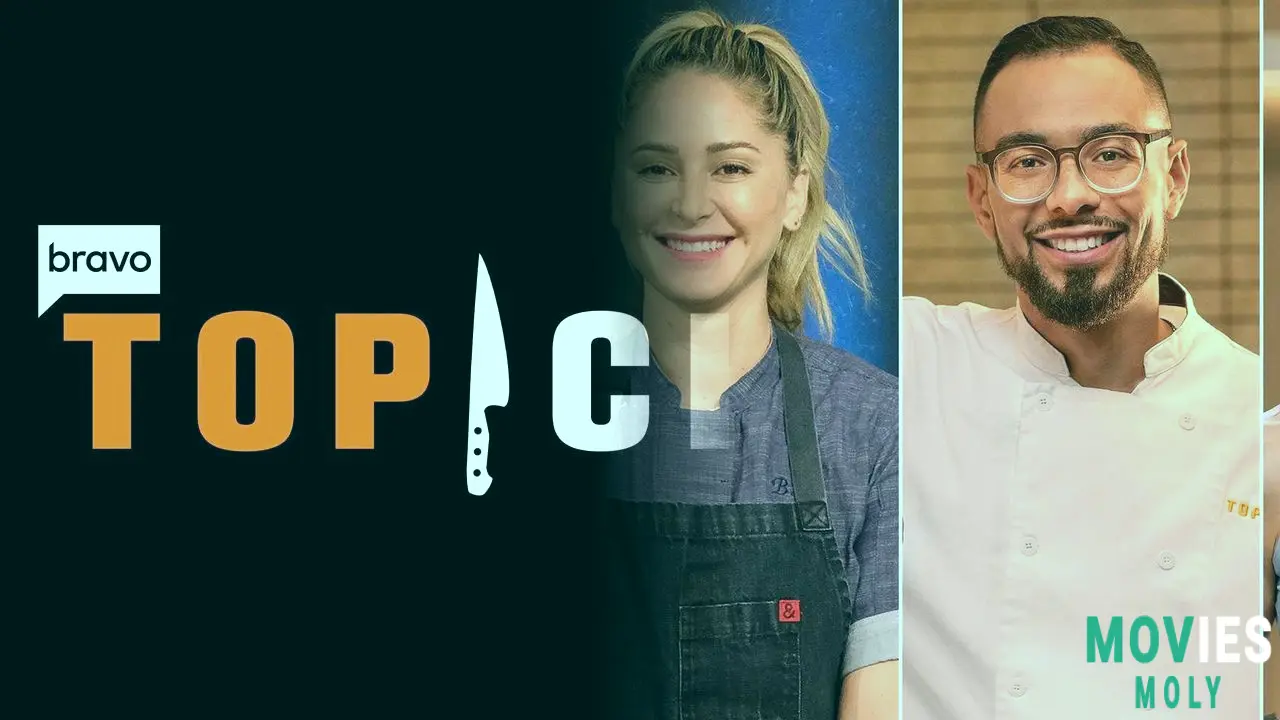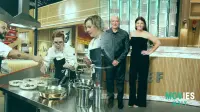If you watch Top Chef frequently enough, you'll probably become used to some of the unusual things the show does. You ignore the product placements, allowing all those car emblems and airline sponsorships to roll right off your back. You might even come to enjoy the steamy trials themed on celebrity guests or popular movies. However, there are always dozens of cooks who clearly enjoy cooking and what they do. If you have even a smidgeon of that love, learning more about their profession is always a good thing.
I truly enjoyed this season. It seemed considerably more at ease in its slightly new groove once Padma left. Kristen did an excellent job as host, and the show appeared to be still in its early stages. Even something as stupid as the hockey saying challenge couldn't dampen my spirits for long. But a second-to-last program with seemingly interminable Olympic ads and a tournament-style elimination to choose the final three? Yes, I believe I can complain about it now.
Let us chat about it. Two weeks after saying goodbye to Massimo in Calgary, our final four arrived in Milan. Tristen noted that his "time off" did not allow him to rest as much as Bailey, César, and Shuai. Instead, Tristen had to bury his stepfather. His stepfather's effect on his life was undoubtedly significant. I'm glad he could be home for a final goodbye. I'm also sorry he had to travel to Milan with so much strain on his shoulders.
The Dreadful Risotto Quickfire Challenge That Turned Out To Be More Than A Cooking TestWatching Skilled Chefs Struggle With A Simple Dish In A City Famous For It
As is customary before the finale, they were thrown right into a Quickfire challenge. The task was both simple and daunting: make risotto. That’s all. But, as any Top Chef viewer knows, "make good risotto" is evidently much more difficult than it appears. Even the best chefs in the world appear to struggle with it. Fortunately, our final four knew they were heading to Milan. This city is well-known for and takes great pride in their risotto. So they must have anticipated this and prepared accordingly, right?
Wrong. Bailey performed a joyous dance, but the men struggled to conceal their nervousness. "I thought I could make risotto disappear from this competition," Tristen lamented. Shuai, bless his heart, frankly stated that he had no experience preparing risotto. "It's something that has failed so many times on Top Chef that I thought, 'There's no way they're going to make us make risotto.'" "Silly me," he admitted. You know what, Shuai? I agree with you there. The fact that so many cooks fail at risotto is precisely why they will force you to try.
Two of the four chefs were immediately stuck in their own heads and opted not to prepare any risotto. César, our gentle prince of new ideas, maintained that risotto is "a technique" rather than a meal. As someone who used to take pride in coming up with inventive new reasons not to write college essays as required, I recognize a failed attempt to locate a loophole when I see it. The end result was a celery-root "risotto" that caused Tom's face to scrunch up like he had just chewed on a sour candy. Massimo's wineglass most certainly broke in his hand in agreement.
To his fair, César had the excuse of panicked when he had to start cooking right away. The others began 5, 10, and 15 minutes later, because Tom required that risotto be eaten immediately when it was finished. Shuai, who started last, had no reason to spend 15 minutes staring at a wall of rice options. He then opted to cook cubed butternut squash in rice stock instead. Tom was not impressed with his or César's workarounds. "Risotto literally means 'of rice,'" he exclaimed. Neither he nor I could believe that half of the top four had entirely overlooked the essential task of this test.
Bailey wanted to make up for her mediocre risotto from the first week. She opted for a red-wine risotto with hazelnut gremolata, as is traditional in northern Italy. It appeared fine, but also quite safe. So it seemed almost unfair to Tristen that he won the Quickfire and $15,000 simply by chance. His food sounded very unique and delicious. His ambition of "bringing melanin to Milan"—which is a beautiful saying—was reflected in this jollof-rice-inspired risotto with scorched butter greens. I need to consume this food right away or I'll pass out. Tristen was equally worried about making risotto as Shuai. Nonetheless, he created his own stunning version. I was hoping Shuai would challenge Tristen for the big win, but this moment proved to me that Tristen truly deserved the Top Chef title. However, before that, the final four had to be reduced to three, which is when things got extremely ugly.
The Confusing Olympic Tournament Elimination Prior to the Grand Finale

Why the premise of this challenge felt so out of place at such a critical moment
You might assume that a risotto challenge in which half of the cooks did not prepare risotto would be my biggest complaint of the week. But no. Not when Kristen announced that the final challenge before the championship would be a three-course head-to-head competition. Nine judges would vote to advance one chef in each round until only one remained. This style could be appropriate for something like Top Chef: Portland's tofu tournament. That one reduced six chefs to five. But forcing chefs fight for a final position by creating meals they may never serve seems absurd.
Furthermore, the amateurish attempts to link this challenge to Milan's forthcoming Winter Olympics were not simply clumsy. They were also really distracting. It was exciting to meet the athletes, but I doubt the chefs were thrilled to be responsible for their own personal Olympian during such a significant grocery shopping trip. Given how bewildered everyone was in the grocery, they would have been better off with their own personal Italian assistant. The ghost of Massimo is howling right now. I am very sorry, buddy. Furthermore, when their new athlete pals joined the judges' table, they all opted out of the first round of judging. They simply voted for the chef they shopped with. None of this would upset me as much if the challenge had occurred much sooner. But this was to get to the end. Why were they doing paddle votes?
Anyway. I should probably discuss the actual dishes. It doesn't matter if they were served. With three dishes and local delicacies such as polenta, beets, and gorgonzola to consider, there was a lot on the line. Throughout the episode, it was evident that the majority of the cooks were more concerned with getting off to a good start with their first polenta dish. They hoped to win and be done. The final Gorgonzola round was equally significant to them. This was done to ensure that they would not be in deep difficulty if it came to it. The beet dish, which was scheduled to be served second, obviously felt like an afterthought.
Bailey made some safer decisions in her early rounds. She prepared a simple parmesan polenta and roasted beets with "ricotta schmear." For better or worse, César was never afraid to take risks. He sampled polenta cake and black walnut ice cream. He also cooked a beet tostada, which required him to press handmade tortillas with only a few minutes left. The judges' scores reflected their relatively rudimentary and fragmented approaches. Neither received enough votes from the nine-member panel. This panel consisted of Tom, Kristen, Gail, the athletes, Michelin chef Andrea Aprea, and my Top Chef: World All-Stars husband Ali Ghzawi. They did not receive enough votes to avoid the scary Gorgonzola round.
Shuai had been doing well in his last several Elimination Challenges. He won the first round. He served well-cooked polenta beside wonderfully roasted duck. I'd love to have tried his planned beet dumplings with smoked salmon. However, he was probably lucky that it did not come to that. His butternut squash Gorgonzola dish seemed half-hearted. Shuai was astonished and relieved to be finished for the day. At least until he was forced to sit and watch the others sweat it out. It rapidly became too hectic to be enjoyable.
The second round went to Tristen. In the first round, his spicy coo coo nearly overwhelmed the judges' palate. But his smoked beets with pikliz and pork belly earned him an almost unanimous win. Again, I wish I could have seen what he would do with Gorgonzola. It was supposedly going to be sherbet. But I was just as happy as he was to see he made it to the finale with little stress.
The same could not be said for Bailey. She was clearly stressed. But she still gave herself the extra challenge of making the judges love brûléed Gorgonzola. This was a dish they pretty much hated just weeks ago. At this point, Bailey was giving so many private interviews and chances to explain her thoughts that I, being foolish, thought this was her goodbye. Nope. Her second brûlée was a hit. It sent César and his casserole home. His casserole was great on squash but not so good on the Gorgonzola. After making so many unique and difficult dishes all season, it was tough to see him go for a recipe that apparently was not even his own. It was his beloved chef de cuisine's. César might not talk as much as some of the other chefs. But I would have liked to hear more from him during what was his last episode as a competitor. Sadly, the TV gods demanded a sacrifice. That sacrifice was 15 minutes of Olympians asking Italian grocery workers for puff pastry.
Reflecting On The Outcome And What Tristen's Win Means For Top Chef's Future

A Look Back At A Season Filled With Surprises And An Exciting Culinary Journey
This was just a very confusing episode. I have now watched it twice. I am still confused. All I can hope for is that the finale had the simplest instructions: "cook your best food" or fail. And that we ended up with a winner who truly deserves the Delta Diamond Medallion Status. That kind of perk is a big deal for a chef. It shows how much the show values its winner.
Tristen Epps-long was crowned the winner of Top Chef season 22. This Houston-based chef won the title of "Top Chef" and a $250,000 prize. He also gets Delta Sky Miles Diamond Medallion Status, a feature in Food and Wine Magazine, and the chance to headline an exclusive dinner at the James Beard House in New York City. Tristen's win was very emotional for him. His father passed away while he was filming the competition. He considered quitting but decided to keep going to make his father proud.
In the finale, Tristen shared his feelings saying "Somebody believed in me enough on their deathbed for me to stay. I'm so happy I made it worth it." He also noted that he was the "First person to pull off Afro-Caribbean cuisine in Top Chef and win." He thanked every chef who came before him and paved the way for his success. This moment really highlighted the personal journey Tristen went through. It made his win even more special. His victory shows how much talent and heart he put into the competition.
The finale featured Tristen Shuai and Bailey making a four-course meal. Shuai focused on his Chinese heritage. Tristen used his Afro-Caribbean roots. Bailey stuck to her unique and unconventional style. The judges Kristen Kish Tom Colicchio and Gail Simmons found it hard to choose a winner because all the meals were so good. Tom Colicchio said "Today's meal was just exceptional." Kristen added that the chefs "certainly delivered on a lot of promises to us, but also to themselves." In the end Tristen's bold flavors and confidence won him the title. It was a well-deserved win after a season full of ups and downs for all the competitors.



